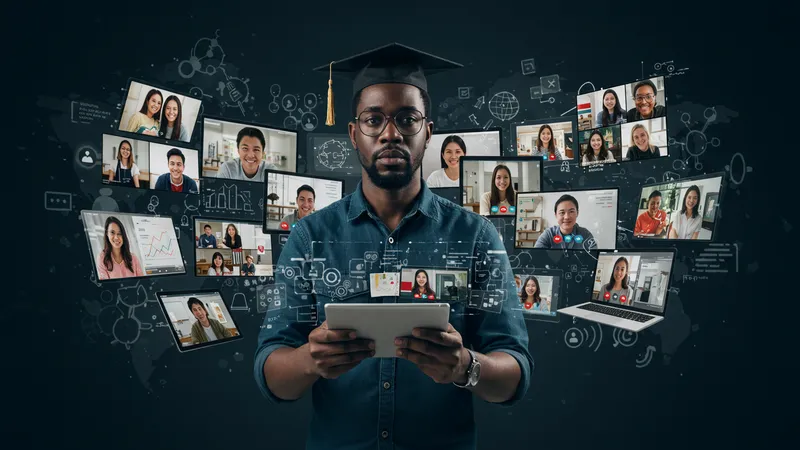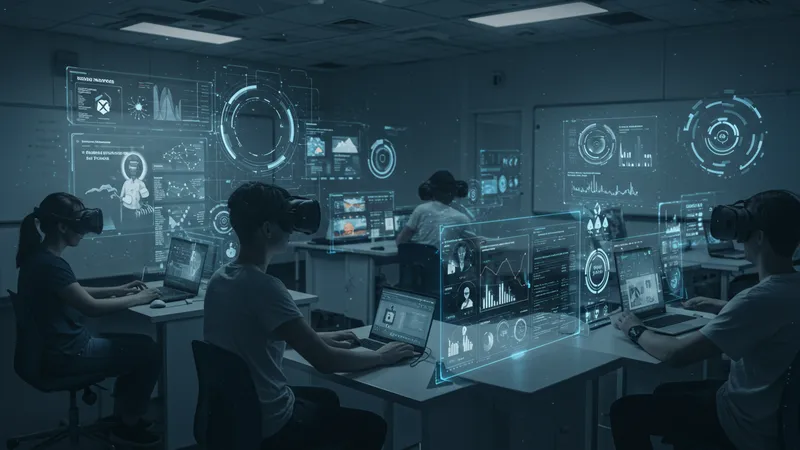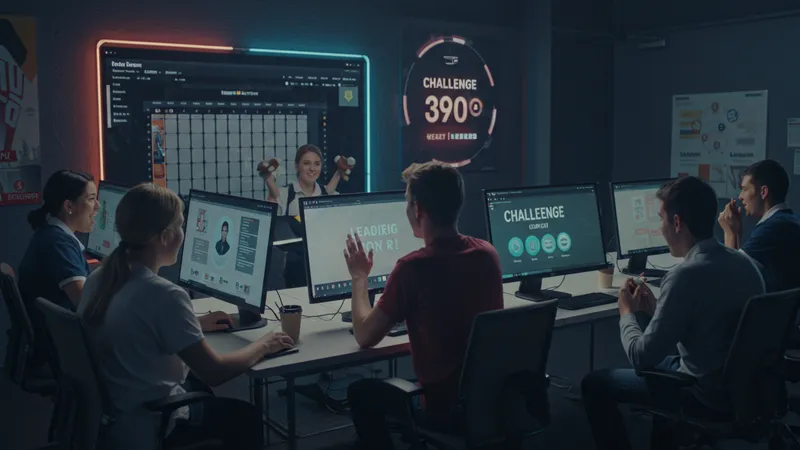Did you know that e-learning platforms are revolutionizing education at an unprecedented pace? From interactive experiences to global accessibility, digital learning is not just a trend—it's a game-changer in the world of education.
In today's fast-paced digital era, the importance of e-learning platforms has skyrocketed. As traditional education faces budget cuts and resource shortages, online platforms provide affordable, customizable, and comprehensive educational solutions. The need to understand this transformation is now more critical than ever.
The rise of e-learning platforms has been nothing short of astonishing. With users growing from thousands to millions within just a few years, these platforms have reshaped how education is consumed. Contrary to popular belief, the quality of e-learning often rivals or even surpasses traditional education. But that’s not even the wildest part…
What if I told you that e-learning is not just for students anymore? Corporations are rapidly adopting these platforms for employee training, which has proven more effective and cost-efficient than in-person training programs. And the educators are overwhelmingly supportive of this shift. But that's not even the wildest part…
What happens next shocked even the experts. Prepare to uncover the unheard stories behind the digital revolution in education and how it is setting new standards in learning efficacy and accessibility.
While e-learning platforms offer unparalleled accessibility and flexibility, their true cost is often overlooked. Subscription fees, certification costs, and hidden add-ons can accumulate quickly, catching many by surprise. But there's one more twist...

Many learners believe they are saving money, but indirect costs, such as increased electricity usage and internet plans, add up over time. This hidden expense shifts the perceived value of e-learning differently than many anticipate. What you read next might change how you see this forever.
An unexpected hurdle is the technology required to access these platforms. Although many courses are available on mobile devices, the optimal experience often requires higher computing power. This demand places a financial burden on the learner that rivals the cost of traditional educational resources. But there's another twist...
Despite the initial investment, the future savings from skill enhancement and career advancement through e-learning may far outweigh these costs. This balance of initial expenditure versus long-term gain is a crucial consideration. What you will discover after this might surprise you.
Embracing e-learning can significantly impact learners' psychology. The shift from a structured classroom environment to an independent study mode can lead to issues like procrastination and isolation. But the twist is in how learners overcome these challenges...
Engagement strategies employed by e-learning platforms, such as gamified content and interactive forums, are boosting motivation and reducing feelings of isolation. This sense of community has transformed online education, making students feel connected even across distances. But wait until you learn how deep this goes.
There's also the forgotten benefit of e-learning's adaptability to different learning paces and styles, leading to improved mental well-being among students. Stress and anxiety commonly associated with traditional education methods are significantly reduced. But that's not the entirety of the story...
The ability to revisit materials and learn at one's own pace has boosted confidence in learners, proving that e-learning is not just an alternative but a superior choice for many. This transformation in learner psychology is just the beginning. You won’t believe what’s coming next.
Educators' roles are shifting dramatically with the rise of e-learning. Once bound by geographical constraints, they now enjoy global reach and diverse teaching opportunities. This change wasn’t what everyone expected...

Online platforms have allowed educators to innovate their teaching methods and receive direct feedback from a broader audience, leading to continual development and refinement of educational content. But there's more to this unexpected benefit than meets the eye.
Furthermore, educators are finding new revenue streams through e-learning, such as creating custom courses and engaging in collaborative projects. This unexpected financial benefit is reshaping their career landscapes. Yet, there's another twist you might not see coming...
Despite the challenges posed by digital teaching, many educators report greater job satisfaction due to increased flexibility and the ability to reach and impact a larger student base. It’s a career revival happening in real-time. But the story doesn’t end there.
E-learning platforms are on the cutting edge of technology, integrating artificial intelligence, virtual reality, and data analytics to personalize educational experiences. This technological infusion is unlike anything we've seen before...

AI-driven analytics provide insights into student performance, allowing platforms to tailor content delivery in real time. This precision learning approach is revolutionizing how effectively students can master new concepts. But there’s a twist that takes this even further.
Virtual reality is being harnessed to create immersive learning environments, offering experiences that were once thought impossible without physical presence. Imagine practicing surgical methods through a virtual interface. It’s happening now. But that's not all there is to know...
As technology advances, the line between traditional and e-learning continues to blur, paving the way for a hybrid approach that could become the new norm. What e-learning will look like in a few years is beyond imagination. The next revelation will leave you speechless.
A remarkable shift is occurring with how credentials are viewed. Employers are increasingly valuing certifications from e-learning platforms alongside traditional degrees, reshaping career landscapes globally. But there’s a hidden facet...

Micro-credentials and badges, earned from completing specific skill-based courses, are gaining traction, leading to a faster-paced career advancement model. These bite-sized proving grounds might alter education permanently. But wait until you hear where this is heading...
This trend is encouraging learners to continually update their skills, aligning education with the fast-paced changes in global industries. The continuous learning loop is becoming a critical career advantage. But there’s another twist you didn’t anticipate...
Ultimately, the redefinition of credentials is enabling learners to curate personalized educational journeys that enhance employability and job satisfaction. This versatility in education is just the tip of the iceberg. What comes next could redefine success metrics forever.
One of the overlooked facets of e-learning platforms is the diversity of business models. From subscription services to freemium offerings, each platform is uniquely positioned in the market. But there's an underlying story here...
Platforms offering free content with premium add-ons are leading in user growth, as they cater to a broader audience's initial curiosity before monetizing advanced features. But there's a strategy that pays off even better...
Another burgeoning model involves sponsorships and partnerships, allowing content creation to flourish without significant user fees, amplifying accessibility. It's a win-win scenario for learners and creators alike. But what this leads to is unexpected...
The innovative approaches to monetization are intensifying competition, pushing platforms to constantly enhance user experience. The evolution of these models is rapidly reshaping the digital educational landscape, but the next big leap might defy convention altogether.
Despite the extensive reach of e-learning platforms, global accessibility remains a daunting challenge. Internet connectivity is not universal, creating gaps in who can engage with these digital educational resources. But there’s a silver lining...

Efforts are underway to address these disparities, with projects aimed at enhancing internet infrastructure in underserved regions, promising a more inclusive future. This transformation could bring the unreachable within everyone's grasp. But only if another barrier is crossed...
This challenge also drives platforms to innovate in content delivery, such as offline access and low-data solutions, which could become game-changers in ensuring nobody is left behind. But an even more impactful change is on the horizon...
Seeing e-learning as a catalyst for global educational equity, initiatives by governments and tech giants are underway to bridge these gaps, fueling hope for a more enlightened and connected world. How this scenario unfolds could change countless lives, but there's more at stake.
The concept of lifelong learning is being embraced more than ever due to the rise of e-learning platforms. But many underestimate the profound impact this will have on society. Let’s explore this further...

With the barriers to education lowered, people of all ages are exploring new fields and skills, leading to continuous personal and professional development. This cultural shift is huge, but not everyone sees what's next...
The democratization of knowledge is empowering individuals to pursue passions and careers they hadn't previously considered possible, supporting intellectual and economic growth. Yet, the full consequence of this shift is yet untapped...
E-learning is not just about delivering knowledge—it's fostering a culture that values ongoing education as a cornerstone of a thriving future. As we delve deeper into the implications, the potential transformations are astounding. Brace yourself for what's beyond the horizon.
Gamification in e-learning platforms is changing how students engage with educational content. By incorporating game-like elements, these platforms enhance motivation and retention. But the full effects are just surfacing...

Game dynamics such as points, leaderboards, and challenges make learning feel interactive and rewarding, leading to increased completion rates and improved outcomes. Yet, the next evolution of this approach holds even more potential...
This innovative strategy meets learners where they are, effectively combining entertainment with education, making learning an enjoyable experience. But there's an adaptation that could take this even further than expected...
The future of gamification is stepping beyond traditional education, finding its way into corporate training and beyond, ensuring engagement across all learning spectrums. The broadened application of these strategies opens new vistas in how we approach global education. Get ready for even more game-changing insights next.
The rise of e-learning platforms has fostered vibrant online learning communities where learners can share insights, provide support, and collaborate on projects, creating a social fabric that enhances educational experiences. But there’s a dynamic at play...

These communities are breaking down the isolation often felt in digital learning environments, providing a social structure that enhances motivation and accountability. This shift in dynamics is rebuilding the sense of community found in physical classrooms but with broader outreach...
The peer-to-peer learning aspect helps fill gaps that traditional instructor-led courses might leave, enriching the learning experience through diverse perspectives. But an emerging trend takes this concept a step further...
AI-driven community interactions, where insights and experiences are algorithmically shared, hint at a revolutionary way to connect learners worldwide, ensuring personalized and communal learning can coexist harmoniously. The changes upcoming in this area will redefine connectivity itself.
With the surge in screen time due to online learning, digital fatigue has emerged as a significant challenge for learners. But innovative solutions are underway to counteract this adverse effect...

Platforms are integrating short, engaging modules that allow for breaks and provide cognitive refreshment, reducing the risk of burnout and maintaining enthusiasm. This shift in content delivery is just the beginning of combating fatigue...
Additionally, encouraging offline activities and hands-on projects is re-engaging learners’ senses, making education a multi-modal experience that minimizes monotony and promotes holistic learning. But there’s a broader strategy on the rise...
The future of digital learning will likely see augmented reality and blended learning models cementing their roles, ensuring that engagement and effectiveness remain high without the drawbacks of excessive screen reliance. The imminent shifts will redefine resilience in digital education.
As e-learning continues to transform the fabric of education worldwide, key lessons and trends have emerged that showcase the promise and challenges of this digital age. The journey has been nothing short of transformative...
Your engagement can help bridge gaps and empower more learners. Share this article to spread awareness, bookmark it to revisit the evolving trends, and become a part of shaping the educational landscape of tomorrow.